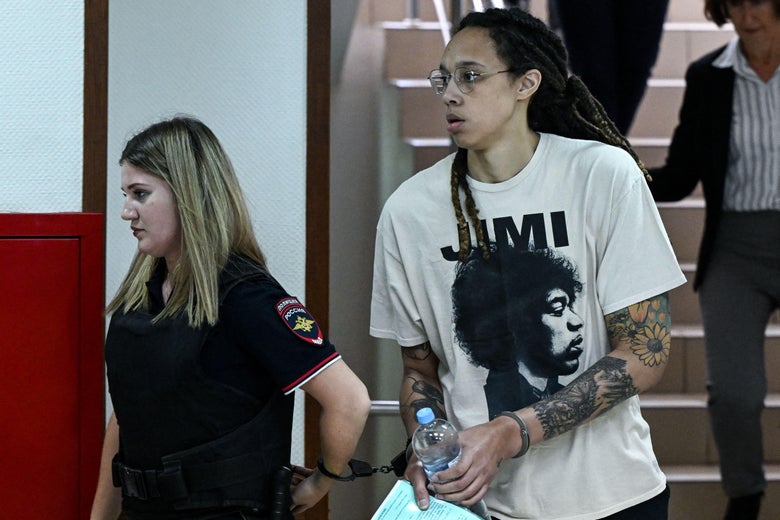When reports appeared that Russia might let women’s basketball star Brittney Griner out of jail if the United States freed Viktor Bout, the idea seemed unlikely, even preposterous.
Griner, a two-time Olympic gold medalist and six-time WNBA all-star who plays on a Russian team during the off season, was arrested four months ago at Moscow’s Sheremetyevo airport for carrying vape cartridges and hashish oil in her luggage. Bout (pronounced “boot”), is the world’s most famous international arms trafficker. Nicknamed the “Merchant of Death,” he was convicted in a federal court for conspiring to sell weapons to a terrorist group.
In short, the exchange would be far from equal.
However, the last few paragraphs of a long story about Griner’s plight in Sunday’s New York Times suggest that an exchange wouldn’t be so improper or improbable after all. The article quotes Shira Scheindlin, the former judge who presided over the Bout trial, as saying that a swap might not be a bad idea—as long as Russia freed not only Griner but also Paul Whelan, a former U.S. Marine who was arrested on espionage charges in 2018.
Bout has served 11 years in a federal prison, almost half of his 25-year sentence, and Scheindlin thinks that’s enough. In fact, she thought the sentence “was too high at the time.” Bout was convicted of conspiring to sell arms to the FARC, the Colombian guerilla group that the U.S. had designated as a terrorist organization. However, Bout himself “was not a terrorist in my opinion,” Scheindlin said—”he was a businessman.” But under U.S. law, 25 years was the minimum sentence for someone convicted of selling arms to terrorists, so she had no choice.
Now, though, she told the Times, “I think the United States’ interest in punishing him has been satisfied, and it would not be a bad equation to send him back if we get back these people who are important to us.”
Tuesday morning, I emailed Scheindlin—who is now retired from the bench, working as a private litigator and arbitrator—and asked whether (1) the Times article accurately captured her views and (2) she has recently discussed the case with any U.S. officials. She replied. “1. Accurate. 2. No.”
Scheindlin’s view is notable: If the judge who sentenced Bout now believes that it wouldn’t endanger national security to let him go after 11 years of time served, that could give Biden more political leeway to trade his freedom for Griner’s, whose plight has become a major priority for the administration.
In May, the State Department declared that the Russian government had “wrongfully detained” Griner, a classification that is often a prelude to negotiations. Secretary of State Antony Blinken has since said the U.S. government has “no higher priority” than to bring Griner home. Forbes reported in May that negotiations for a prisoner swap were underway, though officials have not confirmed the story.
Bout is 55, fluent in six languages, a veteran of the Soviet military and perhaps the KGB. After the end of the Cold War, he formed an air-freight company that, before long, carried arms shipments to war-torn countries in the Middle East and Africa. Authorities tracked his movements—in Libya, Angola, Congo, Sierra Leone, and among Hezbollah militias, where he negotiated many of the arms sales—but couldn’t do much about them because selling arms isn’t quite illegal and the Security Council lacks an enforcement unit.
In 2008, Bout was arrested in Thailand for arranging to sell millions of dollars’ worth of weapons to undercover agents from the U.S. Drug Enforcement Administration, who were pretending to be members of FARC. Thai authorities agreed to extradite him to the U.S. for trial. Finally, Bout had committed an act—trying to supply arms to a terrorist organization—for which he could be tried in a federal court. He was convicted in 2011.
Top Kremlin officials protested at the time that Bout’s trial and arrest were political shams. Though Bout was a private arms dealer, it is widely believed that his acts were abetted by Moscow authorities—and, in fact, would not have been tolerated, had he not also done some favors for the Russian government and its allies.
Griner’s trial on drug charges, which began Friday, are also mired in neo-Cold War politics. Some doubt whether she would have been arrested if not for the hostile tensions between Washington and Moscow. Russian President Vladimir Putin may also see the case as an opportunity to spotlight his crusade against drugs and homosexuality, which he sees as Western scourges. Griner’s wife, Cherelle Griner, has written President Biden and other officials to do more to extract Brittney’s release. A handwritten letter from Brittney, delivered to the White House on Monday, also pleaded for more help.
Ultimately, it will be Biden and Putin who determine the fates of these unlikely hostage prisoners—the American women’s basketball star and the Russian merchant of death. Can these two presidents agree on anything while Russian and American-supplied Ukrainian soldiers kill one another on the battlefield by the hundreds every day? Or while Biden declares Putin a “war criminal” and Putin denounces even Western-influenced Russians as “scum and traitors”? Can their top negotiators even bargain seriously?
It’s not out of the question. In April, the White House traded Konstantin Yaroshenko—who’d been sentenced to 20 years in a federal prison for conspiring to import $100 million worth of cocaine—for Trevor Reed, a former U.S. Marine who allegedly attacked a Russian police officer.
But both Bout and Griner up the stakes in ways that could complicate a deal. Bout’s crimes are far vaster than Yaroshenko’s. Griner is far more famous than Reed. Biden and Putin have a deeper interest in getting these prisoners released—which may prompt one or the other, or both, to raise the price for their hostages. The makings of a trade are here and plausible. Whether it happens is another matter.
